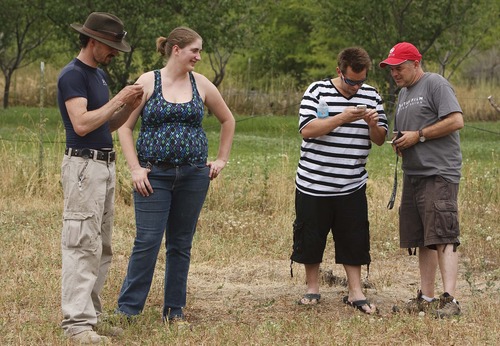This is an archived article that was published on sltrib.com in 2014, and information in the article may be outdated. It is provided only for personal research purposes and may not be reprinted.
After 10 years at the Utah Film Commission, Marshall Moore is leaving as its executive director.
"The deciding factor was the will of continuing to be on the front lines, and the energy that it takes," Moore said in an interview this afternoon, as his resignation became official.
Moore has been executive director since 2007, after working in production services for the commission. He will leave the commission on July 31.
Moore said the 10 years he worked at the film commission was tumultuous, as the local film industry lost the steady income of two network TV series — "Touched By an Angel," which ended its run in 2003, and "Everwood," which stopped production in 2006.
In the last three years, Moore said, the state has been attracting film production, thanks to the tax credits available from the state's Motion Picture Incentive Program.
"We've been creating a pipeline for production, when it was a very scattered and inconsistent industry," Moore said.
One of the last productions Moore has helped bring to Utah is another potential TV series, "Gallantyne," for AMC. The pilot episode wrapped shooting in Utah last week, and the network should decide by this fall whether to commit to a full series.
"Everyone will attest to his passion and love for the film community of Utah," said Leigh von der Esch, Moore's former boss at the film commission and as director of what was then called the Utah Office of Tourism before leaving in 2012.
"He's made a remarkable contribution over 10 years," said Moore's current boss, Vicki Varela, director of what is now called the Utah Office of Tourism, Film and Global Branding. "He left the industry better than he found it."
Derek Mellus, production-services executive in the Utah Film Commission, said "the legacy he'll leave behind [is] how much he really does care about the people of the local film industry."
Moore, von der Esch said, knows the movie business because "he came out of the crew base," working as a location manager on film productions.
"He had a tremendous way of working with the community," von der Esch said. "He had a way with people of getting locations worked out."
Moore also has a talent, Varela said, for working deals with the local film industry, Hollywood executives and Utah government.
"There's nobody who mediates those things like Marshall," Varela said.
Von der Esch also credited Moore with expanding the commission's presence at the Sundance Film Festival, pitching Utah locations to the captive audience of filmmakers and industry folks visiting Park City.
Moore, who turns 52 on Tuesday, wrote on a Facebook post this morning that one factor in his decision was his ongoing battle with non-Hodgkin's lymphoma, which was diagnosed in 2004. "This was part of the decision but certainly not a deciding factor because I feel great right now," Moore wrote.
The list of films Moore and the film commission have brought to Utah ranges from the Oscar-nominated "127 Hours" to big-budget blockbusters "The Lone Ranger," "John Carter" and this year's "Transformers: Age of Extinction."
Other notable productions during Moore's tenure include the Seth McFarlane Western spoof "A Million Ways to Die in the West" and the first American-filmed episode of the BBC series "Doctor Who" — both of which shot scenes in Monument Valley.
Moore also lobbied the Utah Legislature often to increase the state's incentive tax credit for film production, to compete with other states — primarily New Mexico, which has Western landscapes similar to Utah's.
Utah's Motion Picture Incentive Program started in 2005 with a fund capped at $1 million a year for its first three years. Since then, the fund has grown to $6.8 million, offering a tax credit of 20 percent — and in some cases, 25 percent — of a film's budget.
"It's worth it, because film is a great billboard for our state," Varela said.
Under the program, the Governor's Office of Economic Development board last week approved state funds for eight productions — the most ever approved at one time.
"He's leaving on a high note," Mellus said. —
Filmed in Utah
The list of films Moore and the film commission have brought to Utah ranges from the Oscar-nominated "127 Hours" to big-budget blockbusters "The Lone Ranger," "John Carter" and this year's "Transformers: Age of Extinction."
Other notable productions during Moore's tenure include the Seth McFarlane Western spoof "A Million Ways to Die in the West" and the first American-filmed episode of the BBC series "Doctor Who" — both of which shot scenes in Monument Valley.



